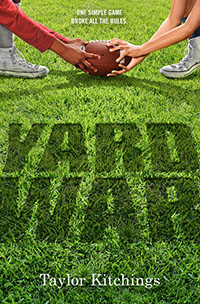What It Was, Was Football—and Segregation
A front-yard football game ignites a controversy in Taylor Kitchings’s new middle-grade novel, Yard War
Taylor Kitchings brings a fresh perspective to the struggle for civil rights in Yard War, his debut middle-grade novel. The story asks an important question of young readers: why didn’t “nice” white people question the justice of segregation?
 The premise of the novel is delightfully simple. It’s 1964 in an affluent neighborhood of Jackson, Mississippi, when twelve-year-old Trip Westbrook asks his housekeeper’s son, Dee, to play football. What follows is not a burning cross in the yard but a careful stripping away of everything Trip thought he knew about his hometown. With big-hearted humor, Kitchings shines a light on all the social spheres of segregated Jackson: the playmates and their parents, other neighbors, the school, the church, the country club, and members of the Westbrook family. Trip struggles to face and defy the unspoken rules that surround him. As pressures mount, his reluctant parents must join him as they decide whether to stay in their home.
The premise of the novel is delightfully simple. It’s 1964 in an affluent neighborhood of Jackson, Mississippi, when twelve-year-old Trip Westbrook asks his housekeeper’s son, Dee, to play football. What follows is not a burning cross in the yard but a careful stripping away of everything Trip thought he knew about his hometown. With big-hearted humor, Kitchings shines a light on all the social spheres of segregated Jackson: the playmates and their parents, other neighbors, the school, the church, the country club, and members of the Westbrook family. Trip struggles to face and defy the unspoken rules that surround him. As pressures mount, his reluctant parents must join him as they decide whether to stay in their home.
Kitchings captures the rich details of the era. The snakes in the yard, the mosquito truck fogging the streets, ironing boards always up, Goldfinger at the local theater. He has an ear for the humor in language. And, thankfully, Trip Westbrook is a real boy, not a born civil-rights activist. Trip is frank and funny and sometimes brave, but he is still a flawed twelve-year-old in a flawed world of white people who sincerely believe the “colored people” they know are happy.
At first Trip is perfectly comfortable lounging around the house while Willie Jane, the family’s housekeeper, makes his lunch and Dee works in the yard. Trip asks Dee to play catch with him only because nobody else is available. Then, after he finds that Dee is a natural athlete, Trip’s main concern is drafting Dee to his neighborhood team so they can win.
 The Westbrooks love Willie Jane; she is a “member of the family” to them, but Trip has no idea where Willie Jane lives; he has never pictured the woman who serves as his “other mother” in any house but his own. Only gradually does he come to understand that Willie Jane and Dee live in a very different world. He is dumbfounded to learn, for example, that Dee’s crowded school has no sports program. (“I never heard of a colored quarterback in the pros,” Trip blurts, “but that doesn’t mean….”) He even orders Willie Jane around at times and is ugly to Dee. But Yard War is a coming-of-age story: Trip ultimately pushes out of the old world, and his transformation is authentic.
The Westbrooks love Willie Jane; she is a “member of the family” to them, but Trip has no idea where Willie Jane lives; he has never pictured the woman who serves as his “other mother” in any house but his own. Only gradually does he come to understand that Willie Jane and Dee live in a very different world. He is dumbfounded to learn, for example, that Dee’s crowded school has no sports program. (“I never heard of a colored quarterback in the pros,” Trip blurts, “but that doesn’t mean….”) He even orders Willie Jane around at times and is ugly to Dee. But Yard War is a coming-of-age story: Trip ultimately pushes out of the old world, and his transformation is authentic.
Kitchings’s treatment of adults is equally nuanced. Trip’s progressive elementary-school teacher notes, “The hardest thing to understand about our state is how people who are so warm and kind and full of ‘Southern hospitality,’ and who would never outright hurt colored people, can be so full of prejudice against them.” But Mr. Dukes, Trip’s Sunday-school teacher twists the story of Hamm, Canaan, and Egypt in a way that prompts Trip to ask if slaves are okay with God. “I’m not saying anything, son,” Mr. Dukes responds. “I’m letting my Bible do the talking.” And even Trip’s normally open-minded mother back-pedals as pressures mount: “It’s not that anything is wrong with colored people, honey,” she says. “It’s just that they are different. And we can’t have them going to our schools and living in our neighborhoods, can we? When you’re older, you’ll understand.”
In the book’s afterword, Kitchings—a former resident of both Memphis and Nashville—notes that “Jackson is different in a thousand ways from what it was in 1964, and incalculably better in one way: now it belongs to everybody.” This is largely true, but good people everywhere are still willing to submit to unjust institutions in the name of tradition and security. By focusing on the casual racism of average people rather than the violence of the KKK (which is so easy to dismiss as “not me”), Yard War may leave its young readers willing to question not only the racism of Mississippi’s past but also the troubling social issues of their own culture.

Corabel Shofner is a novelist, essayist, and former attorney who has raised her family in Nashville, Tennessee. Her debut novel is forthcoming from Farrar, Straus & Giroux..


